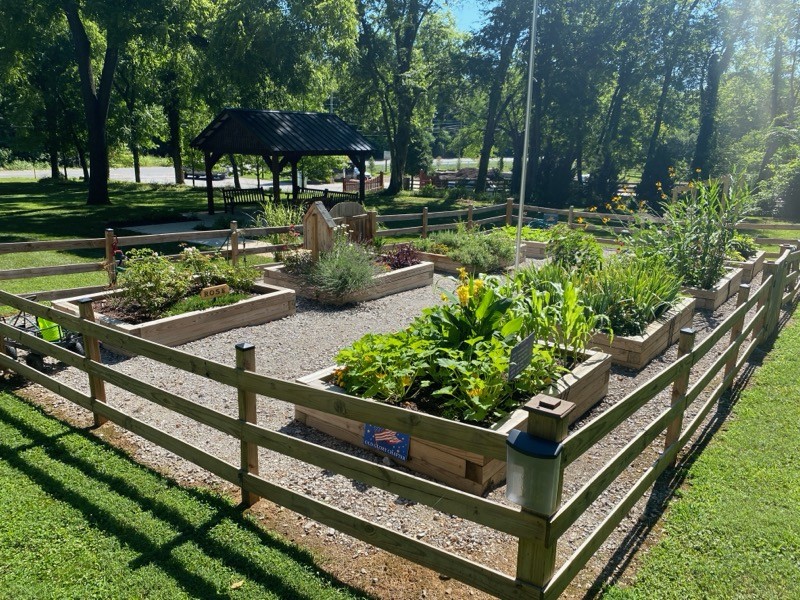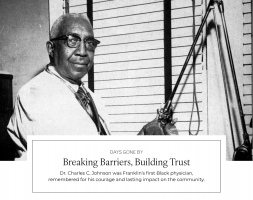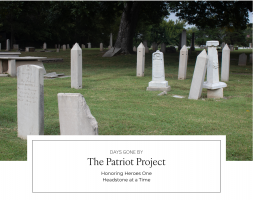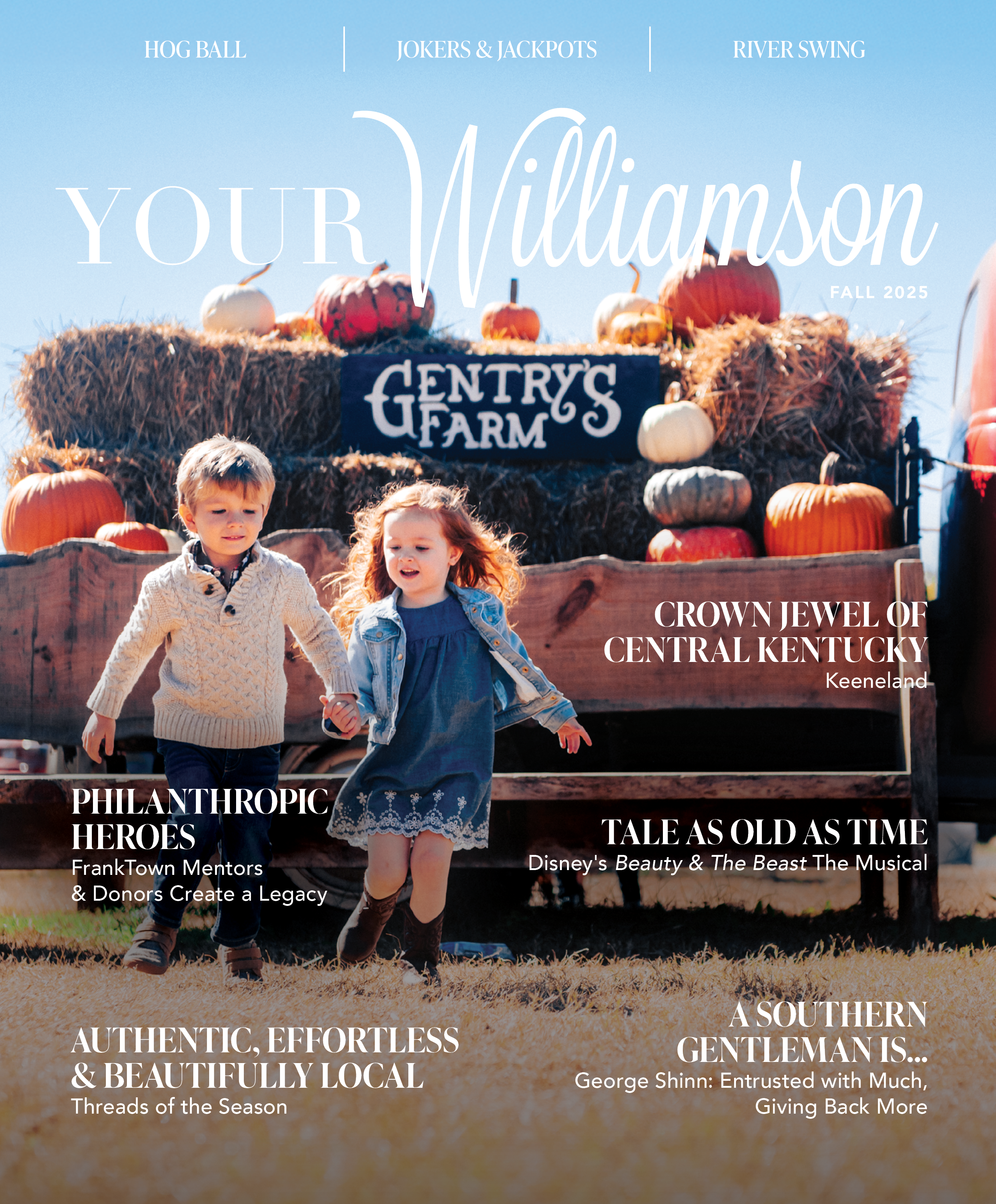
By Katie Shands | Photography Provided by Williamson County Historical Society
With its weathered blue buildings and log smokehouse, Collins Farm in Franklin often catches the eyes of passersby. But beyond the preservation community, few realize the depth of its history. Once home to Native American tribes, later a Civil War battlefield, and eventually a place of hospitality and education, Collins Farm has lived many lives.
Today, Collins Farm is enjoying a new chapter, thanks to the generous efforts of the Old Glory chapter of the Daughters of the American Revolution (DAR). With the installation of a pavilion and thoughtfully curated garden, the land blooms once again—this time in honor of patriotism, education, and historic preservation.
Sowing Seeds of Native American History
Old Glory members Vevia Martin and Cathy Isaacs have extensively researched Collins Farm and helped ensure its story is not lost to time. According to Isaacs, the property’s known history stretches back more than 10,000 years, when Native American tribes inhabited the land.
To honor these early residents, the Old Glory Garden features a raised bed of corn, beans, and squash, planted in the “Three Sisters” formation. This traditional Native American gardening technique fosters symbiotic relationships: Corn provides a trellis for beans, beans enrich the soil with nitrogen, and squash suppresses weeds while retaining moisture.


A Heritage of Military Service & Sacrifice
Another section of the garden, the “Never Forget” bed, honors the 100th anniversary of the Tomb of the Unknown Soldier, symbolizing patriotism, remembrance, and valor: a fitting tribute given the site’s deep military roots.
Around 1784, the property was part of a land grant awarded to Captain James McGavock for his service in the American Revolution. His son Randal later inherited the acreage where, in 1826, he built the Carnton mansion and established a plantation. The years leading up to the Civil War were prosperous ones for the McGavocks, but the Battle of Franklin changed everything.
On November 30, 1864, the northeastern corner of the plantation (later known as Collins Farm), became a site of vicious fighting. Confederate troops stormed over the nearby railroad tracks and into Union defenses. Facing rifle and cannon fire, their losses mounted quickly. Nearly a thousand Confederates died and were temporarily buried on the property. Later, Confederate veteran George W. Cuppett supervised their re-interment in McGavock Cemetery.
As it happened, Cuppett’s father-in-law was William Collins, the overseer of Carnton. In the years after the war, a small farmhouse was built for the Collins family on the section of the plantation where the fighting had occurred. That home still stands today. In 1867, Collins purchased the 3.5-acre lot from John McGavock, Randal’s son, for $525.
The farm’s military legacy didn’t end there. In 1911, it was sold to Captain Thomas Henderson, a well-respected attorney who was part of a daring attempt to kidnap the German Kaiser Wilheim at the end of World War I. Captain Henderson and his wife, Lucille, restored the property, adding plumbing, electricity, and extra rooms. Over the next sixty years, their house and gardens became a gathering place for politicians, artists, educators and writers.
The Hendersons were deeply involved in their community. They helped establish the Carter House as a memorial to the Battle of Franklin. Lucille played a key role in creating Franklin’s first library, which was set up in the Masonic Hall, and later helped found the War Memorial Public Library. She was also an active member of the Old Glory chapter of DAR.
A History Rooted in Herbs
Another raised bed is dedicated to medicinal herbs, honoring their significant role in the property’s past. In 1982, nationally known herbalist Beverly Fennell and her husband, Ernest, purchased the farm, naming it “Hyssop Hill.” Beverly turned the property into a gardener’s paradise. From her home, she operated an herbal cooking school and hosted a long-running PBS show about herbs and gardening. Her expertise even extended into the commercial culinary world. As a former consultant for Kentucky Fried Chicken, she was rumored to have created the restaurant’s famous blend of eleven herbs and spices.
Herbalist Cindy Shapton, known as the “Cracked Pot Gardener,” later acquired the farm. She continued the herbal legacy, hosting festivals and opening a tea room on-site.
In 2001, Save the Franklin Battlefield bought the property to preserve it as a Civil War site. Today, Collins Farm is protected under a conservation easement through the Land Trust. The city of Franklin purchased the land in 2007 and continues to own it.

Old Glory’s Legacy of Preservation
On October 17, 2023, the Old Glory chapter dedicated the garden and pavilion, officially gifting them to the City Parks Department. Though the garden is open to the public, the Old Glory chapter continues to maintain the beds. The garden was the vision of the chapter’s former regent Sarah Ford, and the current regent Lisa Kenney has carried the torch with the help of several dedicated DAR members, including Daphne Caveness, Cathy Isaacs, Kathie Knight, Cheryl Maler, Margaret Reina, Nancy Stubsten and Jane Troup.
The Old Glory chapter, founded in 1897, is a nonprofit, nonpolitical volunteer organization for women who descended from Revolutionary War patriots. They have a long tradition of service, including the preservation of historical sites. In 1915, this chapter restored Franklin’s Old City Cemetery where 340 pioneers are buried. One hundred years later, they refurbished the cemetery’s wrought-iron gates and rededicated the tomb of the Revolutionary War veteran Guilford Dudley. Along with historic preservation, Old Glory’s mission also includes promoting education and encouraging patriotism.
-1.png)
Each Garden Bed Tells a Story
American Heritage Bed: Features heirloom roses cultivated in America since the 1800s, with the exception of the Harwood Rose, which is a “found rose.”
Native American Bed
Filled with plants native to this region and historically grown by Native Americans.
Never Forget Bed
Commemorates the 100th anniversary of the Tomb of the Unknown Soldier, symbolizing unity, remembrance, and valor.
Tennessee Bed
Includes irises (Tennessee’s state flower), as well as passion flower and Tennessee echinacea, both official state wildflowers.
Medicinal Herb Bed
Showcases herbs historically used for medicinal purposes, including hyssop, in honor of “Hyssop Hill.”
Pollinator Bed: Planted to attract birds, bees, butterflies, and other pollinators. Thanks in large part to this bed, Franklin was designated a “Bee City,” one of only five in Tennessee.
Hosta Bed
Each hosta was chosen for its patriotic name and symbolism.
Visit Collins Farm and experience a living tribute to history. The garden is open to the public at 418 Lewisburg Pike, Franklin, TN 37064. Learn more about visiting Collins Farm Historic Park at
https://www.franklintn.gov/government/departments-k-z/parks/park-locations/collins-farm
https://www.franklintn.gov/government/departments-k-z/parks/park-locations/collins-farm


















